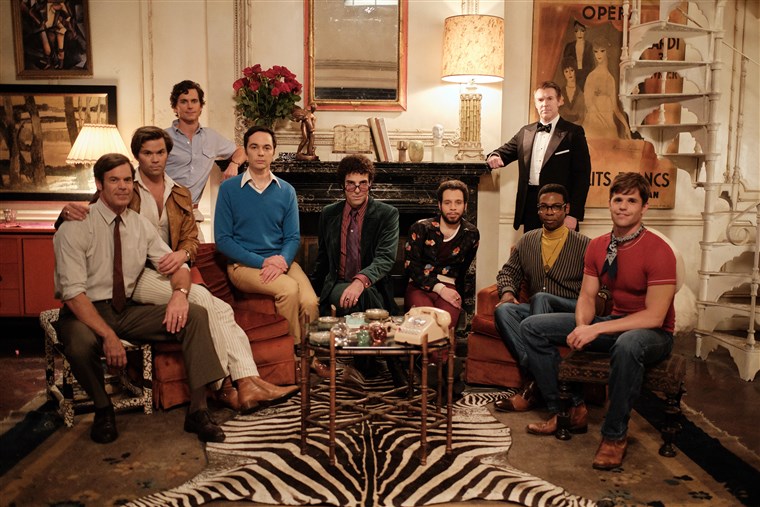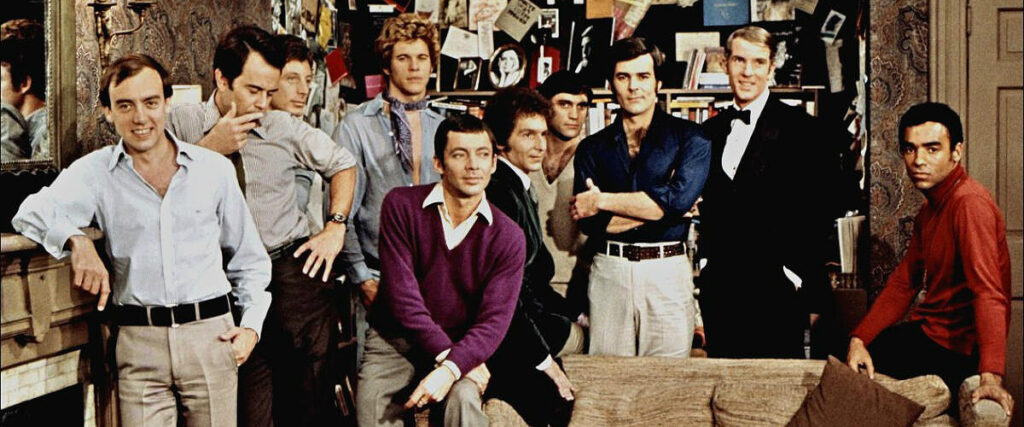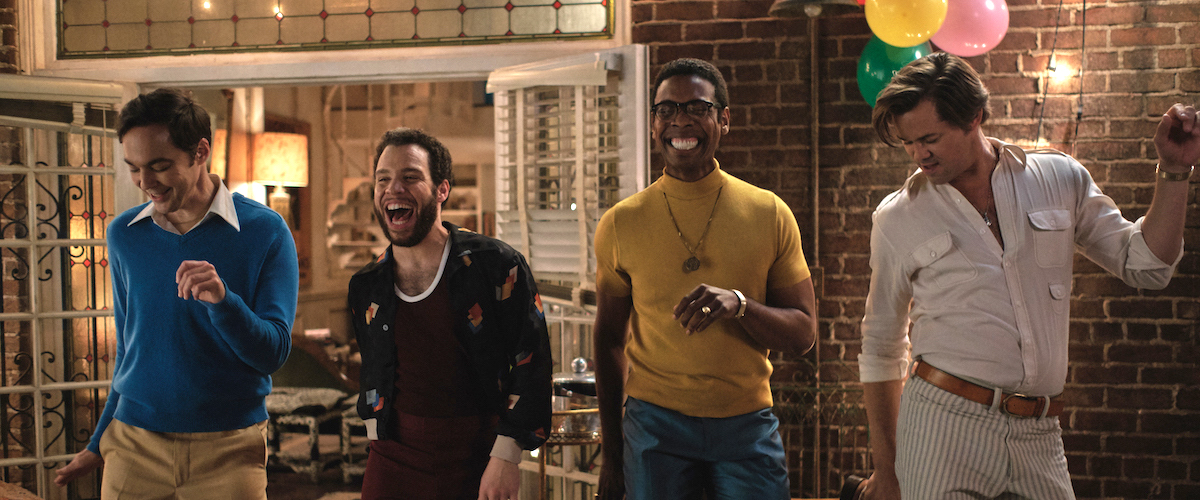“How could his beauty ever compare with my soul? And although I’ve never seen my soul, I understand from my mother’s Rabbi that it’s a knock-out. I, however, cannot seem to locate it for a gander.” – Harold in The Boys in the Band
I first became familiar with The Boys in the Band through the 1995 documentary The Celluloid Closet. The doc, based on Vito Russo’s study of queer visibility in Hollywood movies, presented the 1970 William Friedkin film as the first to show gay people as real people rather than just as stereotypes, and, this is crucial, the first in which none of the gay characters died at the end of the story.
When I watched The Boys in the Band for myself, it seemed like a time capsule, with dated outfits and music, camp references that went over my head, and a lot of bitchy self-loathing that hardly matched the out-and-proud vibe of the late 90s.
It was some time before I learned the cultural context of The Boys in the Band. How it started as a wildly successful off-Broadway play (written by Mart Crowley, debuted in 1968) that was considered the first to introduce real gay characters to the stage. But in the interim between the play and the movie, Stonewall happened, and the movie version, although it faithfully adapted the play right down to using the same cast, was immediately looked upon by newly-liberated queers as part of the old order they had just overthrown.
I’ve watched the original film several more times as I’ve gotten older, and I understand it better now, not just the camp references, but the “meat” of the play. I’ve been in enough social and professional settings to see the way queer people take their hurt out on each other like the characters in the film–if not with as much wit as the Boys. Psychologically and spiritually, we are still sometimes the walking wounded.
That’s why Boys has fresh relevance at a time when things have supposedly never been better for queer people. And why the new Netflix filmed version, based on the Broadway revival (both directed by Joe Mantello) and starring nine out gay actors, couldn’t have come along at a better time. The work of the queer soul that is central to The Boys in the Band has never been more vital.
The story takes place in Manhattan in the summer of 1968. A gay man named Michael (Jim Parsons) is hosting a birthday party for his friend Harold (Zachary Quinto), and has invited his own best friend Donald (Matt Bomer), a couple named Hank (Tuc Watkins) and Larry (Andrew Rannells), an effeminate Latino queen named Emory (Robin de Jesús), and a bookish black friend named Bernard (Michael Benjamin Washington). Two unexpected guests later arrive: an attractive young hustler dressed as a cowboy, whom Emory has hired as a “gift” for Harold (Charlie Carver), and Michael’s straight former roommate from Georgetown, Alan (Brian Hutchinson).
The first act is highly entertaining. It begins with Donald and Michael talking about their lives as they dress for the party—Michael complains about his debts and hair loss, Donald about his struggles with psychoanalysis. What I love about this scene is the tenderness and casual comfort between these two. Michael offers Donald sandalwood soap to cheer him up; they exchange self-deprecating humor and camp movie references (“What’s more boring than an old queen doing a Judy Garland imitation?” “An old queen doing a Bette Davis imitation”); Donald unselfconsciously strips and showers in front of Michael; the scene finishes with Donald wrapping his arms around Michael from behind and resting his chin on his shoulder. Their interaction shows the beautiful intimacy of gay male friendship.
When the other guests arrive, their boisterous conversation is a lesson in mid-century gay slang: “Mary,” “Queen,” “Fairy,” “Nellie,” “Fruit.” Much of the gay repartee is either led by or directed toward the flamboyant Emory, whom the others compare, at various moments, to a street prostitute, B movie star Maria Montez, and a Victorian woman named Emily. When the delivery boy comes knocking on the door with the birthday cake, Emory screams, “Oh my God, it’s Lily Law, everybody three feet apart!” “Lily Law” was a camp name for the cops that raided gay bars.
The most joyous part is when the partygoers crank up “Heat Wave” by Martha and the Vandellas and start a choreographed dance, “like they used to do on Fire Island,” joking about themselves as “the geriatrics Rockettes.” The scene shows gay friendship at its playful, boisterous best.

For many gay men, the first half of the original film was their first awareness that they had a tribe. That in the cities, there were gay men who got together in casual settings to eat, drink, dance, and trade witty repartee. The Boys in the Band was surely responsible for the migration of many queer immigrants to San Francisco, New York, West Hollywood and dozens of other smaller gay centers around the country.
Just when we think this drama is going to turn into a musical, Alan, the straight school chum, arrives—he is going through some kind of personal crisis and desperately wants to talk to Michael. Alan being at the party throws Michael into a tailspin, as his closeted past collides with his only slightly uncloseted present. He can’t think of how to introduce his straight, socialite college buddy to a party made up of “screaming queens singing happy birthday.” Michael, who has been abstaining from alcohol because he knows it makes him viciously hostile, begins downing vodka.
Then the birthday boy Harold enters, and Michael immediately lays into him for being late. Harold responds with a line that somehow manages to mix self-regard and self-loathing into one thought:
“What I am, Michael, is a 32 year-old, ugly, pock marked Jew fairy, and if it takes me a little while to pull myself together, and if I smoke a little grass before I get up the nerve to show my face to the world, it’s nobody’s god-damned business but my own…And how are you this evening?”
Harold and Michael begin bantering with each other in comments that get increasingly barbed and personal. As long-standing but hostile friends, they seem to be able to lacerate each other in the places where they know it will hurt the most.
The second act of the film is the part that many gay men have found either retrograde or just plain depressing. In a turn that wouldn’t be out of place in an Edward Albee drama, the now dangerously drunk Michael wants everyone to play a game. They have to call the one person on the phone that they think they have truly loved and tell them they loved them. In an act either of superiority or of self-preservation, Harold refuses to play, sitting on the sidelines as a kind of bitchy Greek chorus.
Some of the characters, drunk and not exercising the best judgment, take part in the game and either do or do not “win” by admitting their feelings to the men they call on the phone. If anyone is tempted to think everything has changed and nothing is like it was in 1968, imagine how most heterosexual men today would react to a call out of the blue from a man they knew in high school or college confessing his undying love.
In the process of playing this twisted “game,” many of the group’s insecurities and personal shortcomings are stripped bare and exposed: internalized homophobia, racism, substance abuse, childhood bullying, the pain and loneliness of the closet, mental illness, and jealousy in relationships.
Finally, when Harold has had enough of this “truth-telling” game, he decides to tell Michael the truth about Michael:
“You’re a sad and pathetic man. You’re a homosexual and you don’t want to be, but there’s nothing you can do to change it. …You may one day be able to know a heterosexual life if you want it desperately enough. If you pursue it with the fervor with which you annihilate. But you’ll always be homosexual as well. Always Michael. Always. Until the day you die.”
By the end of the play, when everyone has left but Donald, Michael realizes he has offended all his friends and collapses on the floor sobbing:
“If we could just not hate ourselves so much,” he cries, “That’s it, you know. If we could just learn not to hate ourselves quite so very much.”
For those who dislike the film, this scene is really too much. Who thinks this way anymore? It’s the 21st century, same-sex marriage is legal, gay men no longer have to hide in the shadows, law and society have changed considerably. But things being better on the outside doesn’t mean everything’s better on the inside. I suspect many queer people, if they really look at themselves, can still identify with Michael’s plaintive cry about the need to abandon self-hatred for self-love. I know I can.
The late Malcolm Boyd, Episcopal priest and gay elder, once spoke of queer soul work as “mud wrestling”:
“The soul brings me down to the ground of my being without any illusions—I can’t hide, I can’t be a hypocrite. I’ve got to deal with the reality of life if I’m talking about my soul. …It’s frequently bloody. We have suffered and are wounded…For the gay person…who is striving to be whole and healed, it’s necessary to embrace the soul and everything that’s found there.”
Wrestling with the soul is exactly what this movie is about. This work can be painful to watch, and even more painful to do for one’s self. It involves facing personal wounds caused by others, and ugly realities about ourselves.
This is why The Boys in the Band is still important today. If the cultural references don’t all hit home, if the clothes and the music (though fabulous) seem dated, if the legal and social situation for people like the relatively privileged gay men in the movie is no longer as dire, there is still queer soul work that has to be done. As people who will always be on the margins of straight society, queer people have a spiritual role to play at the crossroads of gender, sexuality, and human relationships.
And no matter how much better things get, this queer soul work will always be there. “Always. Until the day we die.”

